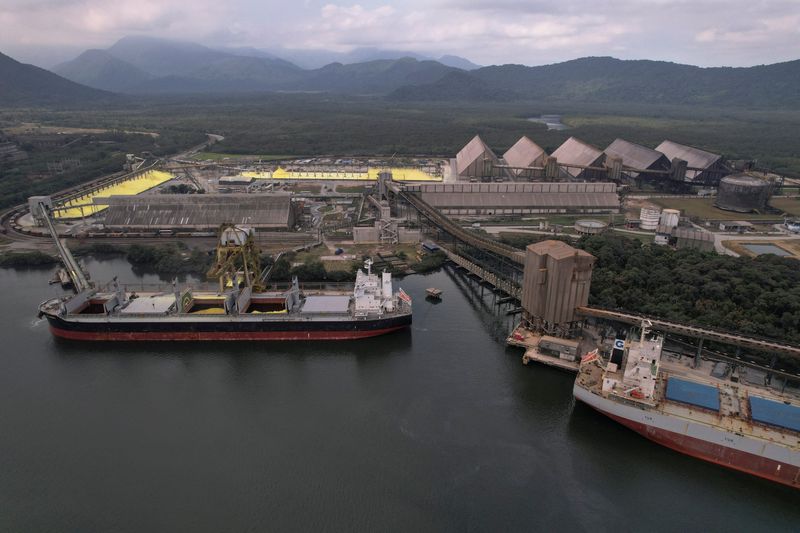Brazil’s record trade surplus tough to sustain after import slump
2024.01.02 09:41

© Reuters. FILE PHOTO: Ships and warehouses containing grains and sugar are seen at TIPLAM (Integrator Port Terminal Luiz Antonio Mesquita) from VLI Multimodal S.A. at Santos port, in Santos, Brazil May 25, 2023. REUTERS/Amanda Perobelli/File Photo
By Marcela Ayres
BRASILIA (Reuters) – Brazil’s record 2023 trade surplus may be tough to repeat this year, private economists and government officials agree, as falling interest rates are expected to boost imports.
Brazil’s oil, mining and farm sectors have built a robust trade surplus over the past decade that is the envy of many regional peers.
However, last year’s surplus grew more than 50% from 2022 to nearly $100 billion largely due to a 12% drop in imports, as the value of exports was almost flat.
That dynamic is likely to change this year, analysts say, as fixed investments are seen rebounding from a 2023 slump due to falling interest rates and major public infrastructure projects drawing private partners.
Data over the past decade show Brazil’s fixed investments and imports typically move in tandem. In the third quarter, fixed business investment recorded its fourth straight quarterly drop, a sequence last seen in early 2016, when Brazil grappled with one of its worst recessions in history.
Slumping 2023 imports, along with stronger volumes of farm and mineral exports that offset weaker prices, lifted Brazil’s trade surplus to a record. That helped cut the current account deficit in 12 months through October to 1.62% of GDP, the lowest since February 2018.
“It seems important…and little-discussed that the improvement in the trade balance and current account is also a reflection of the low dynamism of investments,” said Gilberto Borça Jr., an associate researcher at FGV Ibre.
Even if investments do not surge dramatically, they are likely to rebound in 2024, he added, which could also lift imports.
A government trade official, who requested anonymity to discuss internal forecasts, said the government does not consider the level of the 2023 trade surplus to be structural.
Exports are being supported by higher volumes, which may be hard to maintain, said the official, while stronger investments are likely to boost imports.
After a year of high borrowing costs, Brazilian industry expects a more favorable environment in 2024 due to lower interest rates, said Igor Rocha, chief economist at the Sao Paulo State Industries Federation (Fiesp).
After keeping interest rates at a six-year high to curb inflation, Brazil’s central bank kicked off an easing cycle in August and has already cut its policy rate by 200 basis points to 11.75%, signaling further reductions ahead.








